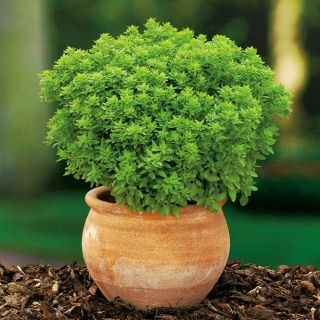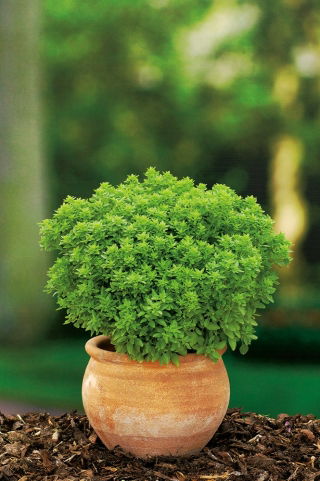Greek basil mini is a unique variety that delights with its small leaves and compact, spherical habit. This annual plant reaches a height of around 30 cm, making it an ideal choice for both gardens and balconies. The aromatic leaves of Greek basil mini are an excellent addition to a variety of dishes, enhancing their flavour and adding a distinctive character. It's perfect in salads, sauces, as well as meat and vegetable dishes. Not only is it an aesthetic choice, but also a practical plant that will certainly diversify any kitchen.
Sowing
Greek basil mini thrives best when seeds are sown directly into the ground or under cover. It's important to remember that the seeds require a light covering of soil and regular watering. The plant prefers warm and sunny locations, which encourages rapid germination and vigorous growth.
Sowing Depth
The seeds of Greek basil mini should be sown at a depth of 0.5 to 1 cm. This depth provides optimal conditions for germination while protecting the seeds from drying out and mechanical damage. Ensuring the correct sowing depth is crucial for obtaining healthy and strong plants.
Sowing Period Under Cover
When to sow Greek basil mini seeds under cover? The best time to start sowing is in April. Thanks to the cover, young seedlings are protected from cooler temperatures, which encourages their rapid growth and development.
Direct Sowing Period
When to sow Greek basil mini seeds directly into the ground? The optimal time for sowing is May. During this period, the soil is sufficiently warmed, which promotes quick germination of the seeds and healthy growth of the plants.
Planting Time
The best time to plant Greek basil mini is mid-May, when the risk of frost has passed. The plants establish well during this period, ensuring optimal development and abundant harvests.
Plant Spacing
When planting Greek basil mini, it's important to maintain a spacing of 20x20 cm. This distance allows the plants to develop freely and ensures they receive enough light, which contributes to healthy growth and abundant yields.
Site Conditions
Greek basil mini prefers sunny and warm locations. The soil should be fertile, well-draining, and well-watered. Regular watering is crucial, especially during dry periods, to allow the plant to develop its full aroma. Enriching the soil with compost is also beneficial for the basil's growth.
Growing Tips
Greek basil mini is easy to grow but requires regular watering and pinching of the tops, which encourages better branching of the plant. Avoid over-watering to prevent root rot. Proper care ensures a rich harvest of aromatic leaves throughout the summer.
Plant Height
Greek basil mini reaches a height of about 30 cm, making it an excellent choice for smaller gardens, balconies, or windowsills. Its compact habit makes it both a practical and decorative element in any space.
Harvest Period
The harvest period for Greek basil mini is from July to September. Regular harvesting encourages the production of new leaves, allowing you to enjoy fresh herbs for a longer period. It's best to pick the leaves in the morning when they contain the most aromatic oils.
Usage
Greek basil mini is perfect as a culinary herb. Its aromatic leaves can be added to salads, sauces, meat, and vegetable dishes. With its intense flavour, it can enrich any dish, giving it a Mediterranean character. It pairs well with tomatoes, garlic, and olive oil.
Resistance to Diseases
Greek basil mini is relatively resistant to most fungal diseases, but it's worth monitoring the plants to respond promptly to any issues. Good gardening practices, such as proper spacing and avoiding excessive watering, help maintain healthy plants.
Good to Know
Greek basil mini is an exceptional plant that not only enhances the flavour of dishes but also looks beautiful in the garden. Its compact form makes it perfect for container growing. Regular pinching of the tops allows for a dense, compact form, which further increases yield.
Why Buy from Garden Seeds Market
Garden Seeds Market offers Greek basil mini seeds that undergo rigorous quality testing, ensuring high quality and reliability of cultivation. Our customers appreciate fast delivery and professional service. By choosing seeds from our store, you can count on full support in cultivation and satisfaction with the results. Promotions and positive reviews from satisfied customers confirm that it's worth investing in premium seeds from Garden Seeds Market.
The package contains 0.5 g of seeds. The package includes information on cultivation guidelines and the expiry date for sowing.






